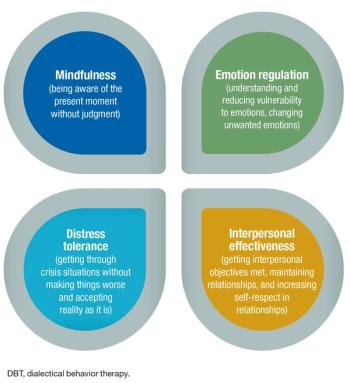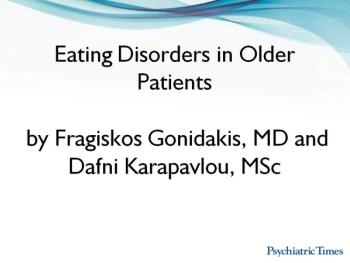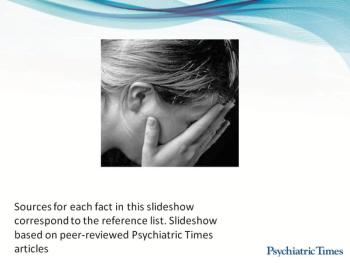
The latest research on DBT for treating psychiatric disorders, such as ADHD, bipolar disorder, eating disorders, and depression.

The latest research on DBT for treating psychiatric disorders, such as ADHD, bipolar disorder, eating disorders, and depression.

Strategies to decrease the chances that individuals will fall through the cracks in the college years.

The challenges in providing mental health care to the college community are significant. Here's a brief look at the issues.

Eating disorders can frequently be unrecognized or masked behind medical conditions, depression, or the natural changes of aging.

Patients with psychiatric disorders, particularly schizophrenia, anorexia nervosa, and substance use disorders, have reduced life expectancies compared with the general population. This and other facts emphasize the need for the latest clinical information, highlighted in this countdown.

Eating disorders are often complicated by devastating medical problems and may result in death. Although studies suggest a multifactorial cause for the disorder, treatment is a still challenge.

There are a considerable number of aging patients with an eating disorder who have only partial symptom remission or who remain ill for many decades. Here is a case in point.

Why do patients with eating disorders resist treatment? How can the clinician address resistance?

Pica, a condition in which a person is compelled to eat non-food items such as dirt, paper, plaster, cigarette ashes, and other substances, is increasing in prevalence in adults. More in this patient education summary.

Research is now making progress in understanding what happens before and during the illness and how this behavior can be explained.

How are individuals with anorexia nervosa able to ignore signals regarding hunger that otherwise motivate eating, even when they are severely emaciated? Expert insights and online coverage by Psychiatric Times during National Eating Disorders Awareness Week.

What do we know about eating disorders and what are the next steps in treatments and research? More in this podcast.

Podcast: Experts summarize effective treatment options for patients with eating disorders and discuss common features, medical components of anorexia and bulimia, behavioral features, and psychological symptoms.

Deep Brain Stimulation is a neurosurgical procedure initially developed for the management of treatment-refractory movement disorders. More recently, the rationale for the use of DBS in anorexia nervosa derives from several sources.

Notwithstanding sparse treatment data, recent efforts are beginning to provide clinicians with some clear treatment guidelines for medically unstable adolescents with anorexia nervosa.

Eating disorders, such as anorexia nervosa, bulimia nervosa, and binge eating disorder remain a challenge, but research continues and more is learned every day. Experts discuss symptoms, diagnostic criteria, and medical complications of eating disorders, as well as implications for treatment.

Anorexia nervosa, bulimia nervosa-or a combination of the two-share body image distortions and are associated with a great deal of other comorbid symptoms.

Eating disorders like anorexia nervosa are resistant to treatment. This case briefly outlines a treatment approach using a community-based, patient-centered model of care.

In the case of orthorexic thinking, clinicians, patients, and their loved ones are bombarded by the same cultural tropes about our bodies and their relationship with the environment in which we live.

A new study examining conventional “start low, go slow” nutrition replenishment protocols for hospitalized patients with anorexia nervosa (AN) that have been recommended by professional organizations and it's outcomes.

We now communicate in ways that are very different from those available just a decade ago. The iPhone, iPad, and similar devices also enable us to observe ourselves as we perform any number of activities. These and other new devices may have an application their designers never considered.

Recent multiple brain imaging studies of patients with restricting-type anorexia nervosa (AN) reveal neurocircuit dysregulation and may help clarify the disorder’s confounding symptoms.

I think I am going to talk about the neurobiology of happiness in my next column. The reason has to do with the nature of our 2-month journey into the biology of eating disorders-a subject that, considering the dearth of explanatory data, is tough to write about. It’s also a bit depressing, considering how difficult it can be to treat. This is the second installment in a 2-part series that focuses on the neurobiology of restricting-type anorexia nervosa (AN).

Appetite regulation is made up of complex interlocking, incentive-driven motivational hormonal and neuronal circuitries . . . that can be pulled in many directions, especially where food is cheap and readily available.

In planning a media workshop to present Glenn Gers’ independent film disFigured for the May 2009 American Psychiatric Association meeting in San Francisco, my co-presenters and I devoted special attention to the diagnosis and treatment of anorexia nervosa. (The content was originally prepared by Katherine Halmi, MD, and was presented at the workshop by James Mitchell, MD, when Dr Halmi was unable to attend.) The film deals with the problems of body image represented by opposite ends of the spectrum of eating disorders-obesity and anorexia.